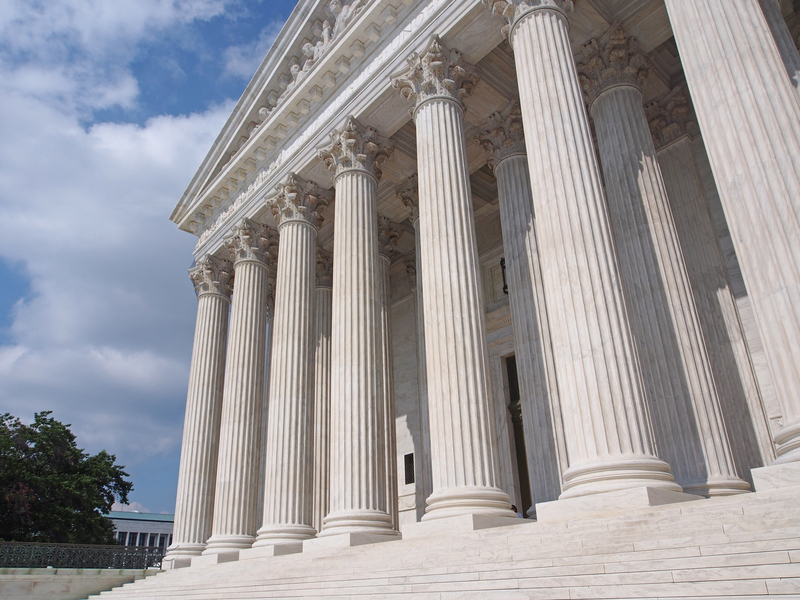
About This Blog
Noonan’s Notes Blog is written by a team of Hodgson Russ tax attorneys led by the blog’s namesake, Tim Noonan. Noonan’s Notes Blog regularly provides analysis of and commentary on developments in the world of New York and multistate tax law. Noonan's Notes Blog is a winner of CreditDonkey's Best Tax Blogs Award 2017.
Contributors
Timothy Noonan
Brandon Bourg
Mario Caito
Ariele Doolittle
Joseph Endres
Daniel Kelly
Elizabeth Pascal
Emma Savino
Joseph Tantillo
Craig Reilly
Andrew Wright
Stay Connected
Showing 23 posts from 2015.
Taxing Cloud Computing: New York Gets It Half Right
 The term “cloud computing” is broad enough to cover a vast array of transactions, all of which use the Internet in some fashion. Two of the most prevalent forms of cloud computing are “software as a service” (SaaS) and “infrastructure as a service” (IaaS). SaaS refers to transactions where software is accessed by a customer remotely over the Internet. The customer does not receive a copy of the software, and the software does not reside on the customer’s hardware. Rather, the customer gains access to the software typically by using its own Internet browser. IaaS refers to transactions where a customer remotely accesses hardware over the Internet. The customer never takes physical possession of the hardware. Rather, the customer accesses the service provider's hardware instead of purchasing and maintaining its own hardware.
The term “cloud computing” is broad enough to cover a vast array of transactions, all of which use the Internet in some fashion. Two of the most prevalent forms of cloud computing are “software as a service” (SaaS) and “infrastructure as a service” (IaaS). SaaS refers to transactions where software is accessed by a customer remotely over the Internet. The customer does not receive a copy of the software, and the software does not reside on the customer’s hardware. Rather, the customer gains access to the software typically by using its own Internet browser. IaaS refers to transactions where a customer remotely accesses hardware over the Internet. The customer never takes physical possession of the hardware. Rather, the customer accesses the service provider's hardware instead of purchasing and maintaining its own hardware.
New York Is Almost Open for Flying: A Sales and Use Tax Update
 Piggy-backing on my colleague Drew’s sales tax update last week on new use tax rules for yachts already in effect, I’m writing with another timely update on New York’s soon-to-be-effective sales and use exemption rules for “general aviation aircraft”.
Piggy-backing on my colleague Drew’s sales tax update last week on new use tax rules for yachts already in effect, I’m writing with another timely update on New York’s soon-to-be-effective sales and use exemption rules for “general aviation aircraft”.
In less than 40 days, the exempt status previously reserved only for “commercial aircraft” will be extended to include “general aviation aircraft” in New York, which include recreational planes, private and corporate jets and helicopters, etc.—basically, aircraft used in civil aviation that aren’t “commercial aircraft.” As part of the 2015-2016 budget bill, the New York Legislature adjusted the rules imposing sales and use tax on nonresident—and resident—aircraft owners alike. The Legislature added a new exemption to Tax Law section 1115 for general aviation aircraft, which is defined to include all aircraft “used in civil aviation,” except commercial aircraft used to transport persons or property for hire. It joins the exemption already on the books for sales and use tax on commercial aircraft primarily engaged in intrastate, interstate, or foreign commerce. The new rule will also exempt sales of machinery or equipment installed on the aircraft. The rule does not exempt drones—sorry, all you early adopters out there.
New York Is Open for Boating: A Sales and Use Tax Update
 Fourth of July has come and gone. This year, nonresidents (more on this later) who brought a new boat to New York for the first time were hit with a breath of fresh air—and I’m not talking about the fresh air from [insert any of New York’s many boater-friendly bodies of water]. In years past, nonresidents who purchased a boat outside of New York and later brought that boat into New York were hit with full New York use tax on the purchase price or fair market value of that boat. As part of its 2015 budget, the New York State Legislature amended the sales and use tax rules applicable to boats.
Fourth of July has come and gone. This year, nonresidents (more on this later) who brought a new boat to New York for the first time were hit with a breath of fresh air—and I’m not talking about the fresh air from [insert any of New York’s many boater-friendly bodies of water]. In years past, nonresidents who purchased a boat outside of New York and later brought that boat into New York were hit with full New York use tax on the purchase price or fair market value of that boat. As part of its 2015 budget, the New York State Legislature amended the sales and use tax rules applicable to boats.
Proceed with Caution: Developments in the Crimes Against Revenue Program
 Earlier this year, Governor Cuomo announced that 28 district attorneys’ offices around the state would receive grants totaling nearly $15 million under New York’s Crimes Against Revenue Program (CARP), which provides substantial monetary grants to district attorneys’ offices in the state to investigate and prosecute crimes against the public fisc. Using CARP funds, DAs in cash-strapped counties can secure resources for staff and other expenses to investigate and prosecute tax crimes. From what we’re seeing, they’re doing just that.
Earlier this year, Governor Cuomo announced that 28 district attorneys’ offices around the state would receive grants totaling nearly $15 million under New York’s Crimes Against Revenue Program (CARP), which provides substantial monetary grants to district attorneys’ offices in the state to investigate and prosecute crimes against the public fisc. Using CARP funds, DAs in cash-strapped counties can secure resources for staff and other expenses to investigate and prosecute tax crimes. From what we’re seeing, they’re doing just that.
ALJ Determines Taxpayer Settlement With the Internal Revenue Service Does Not Need to Be Reported to New York State
 Taxpayers tend to face a difficult road when litigating tax disputes. We recently wrote about that here. It can be even more challenging, and costly, for taxpayers when they have to deal with more than one taxing authority on the same issue. For example, a federal income tax audit that increases a federal tax liability may very likely trigger a corresponding increase in state income tax. Indeed, in New York, like in most states, taxpayers have an affirmative obligation to report a “federal change” to the Department of Taxation. If the Internal Revenue Service (IRS) uncovers additional revenue, New York wants to ensure that it gets its piece of the pie, too. Yet, one New York taxpayer just took this issue – the obligation to report a federal change – to court and won. And he did so in a case involving a tax shelter!
Taxpayers tend to face a difficult road when litigating tax disputes. We recently wrote about that here. It can be even more challenging, and costly, for taxpayers when they have to deal with more than one taxing authority on the same issue. For example, a federal income tax audit that increases a federal tax liability may very likely trigger a corresponding increase in state income tax. Indeed, in New York, like in most states, taxpayers have an affirmative obligation to report a “federal change” to the Department of Taxation. If the Internal Revenue Service (IRS) uncovers additional revenue, New York wants to ensure that it gets its piece of the pie, too. Yet, one New York taxpayer just took this issue – the obligation to report a federal change – to court and won. And he did so in a case involving a tax shelter!
Revised Property Transfer Tax Return Form Requests Additional Information About Hidden Buyers of New York City Real Estate
In February, the New York Times published an 8,000-word investigation into wealthy foreigners buying New York City real estate and taking advantage of U.S. laws that allow them to set up shell companies in order to obscure their true identities. The article, entitled “Towers of Secrecy,” points to Russian mobsters, corrupt Colombian politicians, and polluting Indian mining magnates. This type of publicity doesn’t mean that every person who uses an LLC to purchase or sell a New York City apartment is an apparent Bond villain. But the Times piece does underscore a recent enhanced focus on LLCs’ role in New York City real estate, and anyone considering using an LLC to transfer property in the city should take special note of a recent change to the city’s recording procedures.
New York’s Highest Court Considers Constitutionality of Retroactive Taxing Statute
Questioning the constitutionality of state personal income tax provisions seems to be all the rage these days. On the heels of the Supreme Court’s decision in Comptroller v. Wynne discussed in our recent blog post, New York’s highest court heard oral arguments on Thursday, June 4, for two related cases to determine whether the taxation of nonresident shareholders of S corporations is constitutional.
Come What May: The Power of Testimony in Domicile Cases
 One of the more interesting aspects I’ve seen in residency cases in my practice is the importance and understanding of a taxpayer’s intent in the overall analysis. That’s part of what makes residency cases so unique. There are likely very few situations in federal or state tax law where what is kicking around in somebody’s mind is critical to the determination of the tax issue. But the domicile test—which looks to discover where a taxpayer has his permanent or primary home—turns on the notion that the taxpayer’s intent can be a deciding factor. This can make the audit process really difficult. How do you prove to an auditor what your client was thinking? You can point to objective facts; you can point to case law; but how do you get into someone’s head? And more importantly, how do you convince an auditor to do the same?
One of the more interesting aspects I’ve seen in residency cases in my practice is the importance and understanding of a taxpayer’s intent in the overall analysis. That’s part of what makes residency cases so unique. There are likely very few situations in federal or state tax law where what is kicking around in somebody’s mind is critical to the determination of the tax issue. But the domicile test—which looks to discover where a taxpayer has his permanent or primary home—turns on the notion that the taxpayer’s intent can be a deciding factor. This can make the audit process really difficult. How do you prove to an auditor what your client was thinking? You can point to objective facts; you can point to case law; but how do you get into someone’s head? And more importantly, how do you convince an auditor to do the same?
NY’s Driver’s License Suspension Program: Thousands of Miles of Open NY Road, as Seen From the Passenger Seat
New York’s driver’s license suspension program, used to encourage and enforce delinquent tax collection, is still in its infancy. Two of my colleagues wrote an informative piece about the mechanics of the program, which began in 2013, and they also detailed appeals strategies in the event a taxpayer receives a suspension notice from the New York Tax Department that wasn’t warranted.
The Supreme Court Declares Maryland Resident Tax Credit Structure Unconstitutional Because It Leads to Double Tax
 On May 18, 2015, the U.S. Supreme Court declared Maryland's resident tax credit structure unconstitutional because it subjected income earned outside the state to potential double taxation. The Supreme Court concluded in a 5 to 4 decision in Comptroller of the Treasury of Maryland v. Wynne that this structure impermissibly favored income earned within Maryland over income earned outside the state. According to the court, this effectively created a tariff that violated the dormant Commerce Clause of the U.S. Constitution.
On May 18, 2015, the U.S. Supreme Court declared Maryland's resident tax credit structure unconstitutional because it subjected income earned outside the state to potential double taxation. The Supreme Court concluded in a 5 to 4 decision in Comptroller of the Treasury of Maryland v. Wynne that this structure impermissibly favored income earned within Maryland over income earned outside the state. According to the court, this effectively created a tariff that violated the dormant Commerce Clause of the U.S. Constitution.
Here's a quick review of the facts of the case. Brian and Karen Wynne are Maryland residents. Like most states, Maryland taxes residents on their worldwide income regardless of its source. In other words, Maryland residents can pay tax on income earned outside Maryland. In 2006, Brian Wynne owned stock in a Subchapter S corporation that operated and earned income in other states. In fact, the S corporation filed income tax returns in 39 states. The Wynnes reported the income that flowed through to them from the S corporation on their Maryland income tax returns but also claimed an income tax credit for taxes paid to other states. Almost every state tax code contains a similar credit. These credits are designed to avoid double taxation and to allow for the proper allocation of the tax burden to the jurisdiction where the income was earned.
The problem in the case arose because Maryland imposed two taxes, a state tax and a county tax. Despite imposing two taxes, the Maryland credit for taxes paid to other states only applied to the state tax, not the county tax. Thus, the Wynnes ended up being double taxed on the S corporation income. They paid tax to the states where the income was earned, and they paid the Maryland county tax on the same income. According to the Supreme Court, this scheme violated the dormant Commerce Clause of U.S. Constitution.
This case is notable for several reasons:






